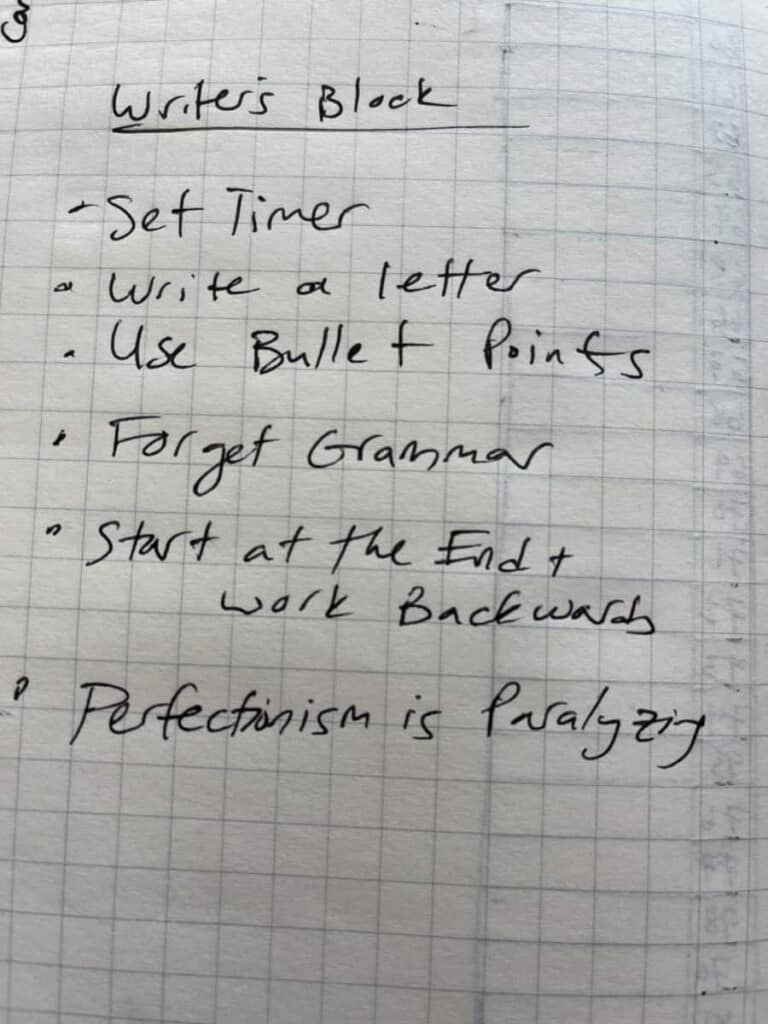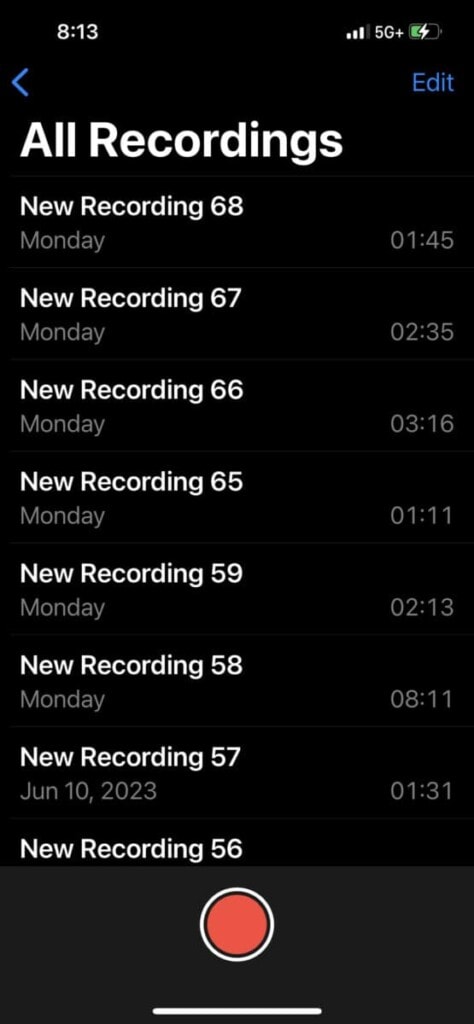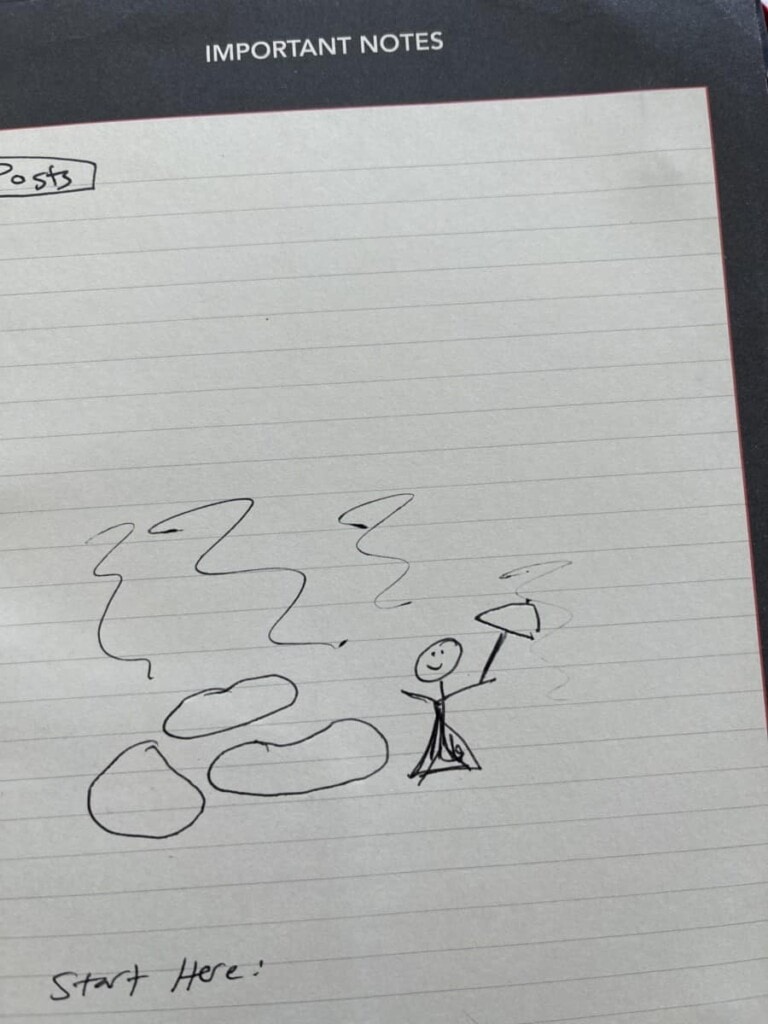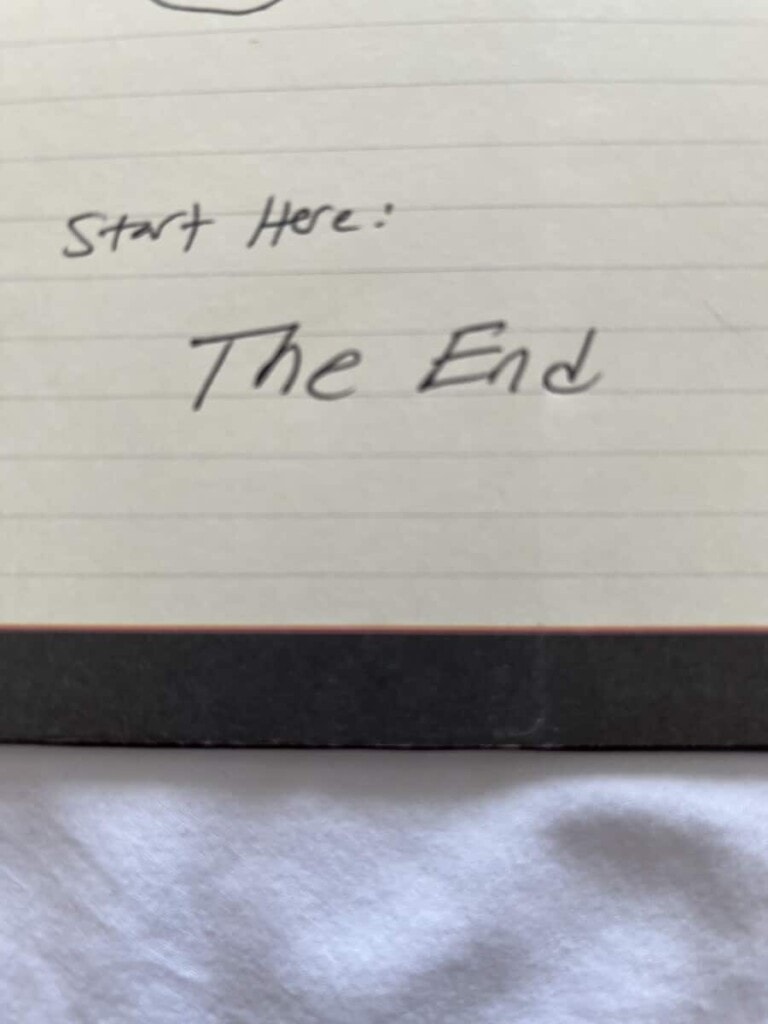This post may contain affiliate links.
1. Set a Timer and Sit Down to Write
It is easy for me to spend an hour in my head, listing the reasons I don’t have time to write. I’m trying to get in the habit of setting aside at least one hour to draft a post. When I let myself go longer than that, I tend to ramble.

Budgeting my time between writing, editing, adding photos, and taking care of administrative issues is helping me not be so lopsided when it comes to running this website.
I’m no computer whiz, and can get so caught up in technical difficulties that I completely leave off writing content. Then I wind up frustrated, because sharing stories is the reason I started this site in the first place.
Generally, I try to turn my ringer off during my writing time; but today, when I went to set my timer, I saw that I’d missed a call.
Was I “just being polite” to put my writing schedule on hold and return their call immediately, or was it actually an excuse for procrastination? Probably a mix of both.
Regardless, I found myself in the midst of a twenty minute call with a request that would completely alter my plans for the day.
I wished I’d stuck to my writing schedule.
I wished I’d waited to hear the voicemail, so I could formulate my response.
The request was actually something I really wanted to do; but the stress of thinking through it on the fly made my right brain shut down.
It was a rookie mistake.
I hadn’t stuck to my boundaries.
I got off the phone and was tempted to scrap my writing session for the day; but instead, I set the timer for one hour and started typing a list of what I planned to say.
2. Make Bullet Points to Keep Your Brain on Track
Writing a list of subheadings helps with staying on topic and lessens long-windedness. It can also get general ideas going and keep writers from getting stuck on details.
Today I knew I wanted to write a post about tips that have helped me break through writer’s block.
One of my main problems is getting stuck polishing tiny details.
By making myself make a list of brief ideas, I can budget my writing time better by giving equal time to each topic I want to cover.
I had to tell myself not to number my bullet points until the end today. As I was typing, I wasted a ton of time deciding, “No, that subject should follow this one,” and then cutting and pasting to put the right number by each bullet.

My note to self for this is, “Wait until the end, and then put your bullet points into a sensible order that helps your topic flow naturally.”
3. Make a Voice Recording of What You Want to Say
The main issues that keep me from sitting down to type are:
- I feel like I don’t have time to write.
- I feel like I don’t have space to write.
- I feel too antsy to sit down at my computer.
- I have no idea what to talk about when I sit down to type.
- I have so many ideas for writing that getting started feels too overwhelming.
It’s taken me a long time to realize that throughout history most stories were told orally. This has freed me from the feeling that my “writing time” has to include pecking away at a keyboard.

When I find myself struggling to type, I allow myself the freedom to “say my thoughts” by using voice recordings.
On my phone iPhone I use the “Voice Memos” app, and on my computer I use the “Dictate” feature on Microsoft Word (along with a microphone) to record my thoughts.
4. Write About What’s Distracting You From Writing
When facing Writer’s Block, sometimes it helps to just take a few minutes to vent and allow ourselves to settle down from frustrations in life before setting to work on the topic we want to cover.
I can waste so much time making excuses for why I don’t have time to write.
If I type them, I am at least practicing my craft as I complain, and if I’m already at my computer, it makes it much easier to segway into the work I want to get done.
After all, I’ve already gotten over my biggest speedbump – sitting down.
It won’t hurt anything to write for a few minutes about what’s frustrating me. It’s not like I’ll have to use white-out to get rid of those first paragraphs of complaining. They can be cut out completely when I clean up my draft.
5. Don’t Get Stuck on Grammar When Writing a Draft
Thinking in terms of writing multiple drafts can help writers keep themselves from getting stuck polishing their first paragraph. Even as I started this post, I was tempted to stall on the headline, because of a grammatical issue I can never seem to get right.

My first time through I wrote:
How to Get Past Writer’s Block
I thought that was wrong and changed it to:
How to Get Passed Writer’s Block
But that just didn’t look right either, so I changed it to:
How to Overcome Writer’s Block
It’s little issues like this that we can waste precious time on. I try to think of writing in terms of building a house.
An architect draws the plans, and an interior decorator does the finishing touches.
Each phase is important. If someone kept trying to dust and polish the building site in the midst of putting up sheet rock, it would be a total waste of time. That’s why I try to get my foundation in place during the ideation phase and then give myself grace to fill in the details one draft at a time.
6. Write About What You’re In the Midst of, Even if It’s the Last Thing You Want to Face
In starting this website, I was wanting to have a landing page for my manuscripts. My mom was dying of pancreatic cancer at the time. People wanted updates on her condition, and I needed an outlet for my grief. That’s how the “More On My Mom” section was formed.
I have to say that there were times I didn’t want to have my mom’s battle with cancer to be a part of this project.
- I had topics I wanted to cover.
- It felt too personal.
- I would write something and receive all sorts of encouragement; but there would be that one comment that felt more like a correction on something that already felt way too raw.
- I felt like I wasn’t getting to move forward with my own life.
- I feared people would think I was trying to monetize my mom’s suffering.
The list could go on and on. I realized that the areas where my humanity is most exposed is probably the best place to start writing. That’s the sort of stuff people most want to read; but I least want to expose.
Even if you aren’t ready to share your deepest struggles with the world, the discipline of working through them (by putting your thoughts into sentences and paragraphs) can help you get passed writer’s block.
With enough practice, there may come a day when you see redemption from all that sorrow and have a strong desire to share it with others who are facing similar circumstances.
7. Write About Memories When You Can’t Move Forward With Your Manuscript
Sometimes, especially during seasons of pain, we can easily get stuck living in the past, or rehearsing what we should have said and done. Writing breeds introspection, and introspection can foster regret.
Taking time to type out some memories can be a way to treasure them, and also a way to keep them from robbing us from time in the future.
If our experiences are put down on paper, we don’t have to be held back by the distraction.
If we’ve taken the time to record events, both good and bad, we can be freed to face future projects, rather than feeling the need to keep mulling over the same scenarios in our heads.
8. Writing About What You Miss Can Bring Inspiration to Your Stories
It is a part of human nature to miss certain creature comforts. When I come across writing that reminds me of my own memories, I have a hunger to read more.
Wendell Berry’s Port William Series has done a number on my heart, especially his “Hannah Coulter” manuscript, which brings a rural farming community and all it’s characters (which are characters indeed) to life, reminding me of my own beloved Wabash, Indiana.
Whether it’s writing about the scent of my grandma’s bathroom, or the occasional stench from the garbage dump near the place I’ve parked to work on my cargo trailer tiny house conversion, reflecting on how a time and place has effected our senses can be a good starting point for more content.
9. Write A Letter to Get By Writer’s Block
Here’s a confession: I used to journal my life away.
I don’t know why; but I felt like I had to record everything to somehow capture the story of the world around me.
I still do that some; but there came a time when I realized maybe my writing wasn’t just for me. Perhaps I should be less introspective and share a little.
Social media scared me, and I really didn’t want to get entangled in it. Besides that, I didn’t know if I had anything interesting to say. Even normal conversation often caused me to bite my lip and stick to my right to remain silent.
I knew a few little old ladies, and I figured they were probably lonely. I wondered if maybe I ought to trade my time journaling into an opportunity for telling them some stories from my daily life, since they were probably craving any kind of news from the outside world. Basically, since they were homebound, they were a captive audience. 🙂

Several years went by when I really didn’t write any manuscripts; but I kept composing letters. This felt depressing for someone who’d wanted to be a writer for so many years.
Then one day, after my grandma’s death, I was given a stack of letters I had sent her. In reading through them, I realized I was holding a story I never intended to share publicly; but maybe someday I will. It shocked me.
10. Write About Connections You’ve Made with Other People’s Stories
When I began spending more time with those same little old ladies, I realized how much we had in common. I was surprised that in their youth they had faced many of the same struggles.
My grandparents were married for over fifty years. I would have never guessed my grandma had thought, “No one would ever want to marry me.” Her sister was over one hundred years old and had long been a widow when she said those same words. My mom told me that was a fear she had, too.
This sharing of inner self-consciousness across multiple generations was a reminder that most of us harbor the same issues. We just don’t know it, because so often they go unspoken.
Be brave enough to say what everybody else is probably thinking!
As I’ve taken the time to listen to people who are older and have more life experience, it has broadened my awareness of the world and helped me put my story into perspective.
I’ve taken comfort in hearing them tell of hardships they faced, and I’ve seen redemption in their pain, as they in turn taught me how to walk through difficult seasons. This gives me courage that one day maybe my story will make a little more sense and have a purpose, too.
11. Allow Yourself the Freedom to Waste Time
We are a culture who wants immediate results. Writing isn’t something that bears fruit in the short term. When it feels senseless to sit and try to type, I remind myself of Monet.
I’m guessing there had to be a time when Monet must have practiced some form of arts and crafts on a more juvenile level before he settled on his famous impressionistic style.
Every artist has to start somewhere. Maybe his parents saved all of his childhood stick figures and cartoonish lily pads; but I doubt it.
Was it a waste of time for him to sit as a child and take the time to create? I don’t think so.
What about as an adult?
I’m sure it took some practice to build his skill, and there were probably some dud paintings along the way.

If somebody had the foresight to pull those out of the trash, they’d probably bring in a hefty sum today; but at the time, they were just that – practice runs toward great paintings.
We need to give ourselves the freedom to write without the pressure of seeing results – either in the realm of praise or monetary rewards.
12. Start with Your Conclusion and Write Backwards
Writing without the stress of seeking monetary results can free us to be creative; but in some ways having “the end in sight” can fuel our inspiration.

There have been times when I have been absolutely stuck on a manuscript – especially when I’ve put page count constraints on myself (to prevent myself from rambling).
When I know how I want my story to end; but don’t want to go on and on, I will write the last chapter and work my way backwards.
This is especially true in the series I’ve been writing about my mom’s hometown.
I’ve had to tell myself, “I can always put details in another book, instead of bogging the story down with too much information.”
By working backwards through the arc of the story, or even switching gears to the part that seems most inspiring on any given day, we can navigate around writer’s block more easily.
13. Use Writing Prompts to Get Your Session Started
Using writing prompts can help enormously when it comes to overcoming writer’s block. I remember in middle school our teacher would write a topic on the blackboard to get us scribbling our thoughts down in spiral notebooks.
Today, I still use that concept.
If my brain is overwhelmed with ideas for topics I want to cover, I try to keep a list, which I can pull from later, on those days when I am feeling less than inspired.
Another huge help, especially when tackling a book project has been a book called, “The 90 Day Novel” by Alan Watt. This has been my go-to guide for all of the manuscripts I’ve written in my series about Wabash, which I’ve been referring to as “A Full-Circle Story made from many broken parts”.
14. Don’t Pressure Yourself Into Polishing Your Manuscript
Perfectionism can be paralyzing. To write truthfully and efficiently, we have to take the time to write for our own eyes only and not worry about what others will think.
As I worked my way through “The 90 Day Novel”, I was greatly relieved to realize there was also a book Alan Watt had written called “The 90 Day Rewrite”.
Having a clear plan for making multiple drafts can free us up to be creative. Setting our work aside for a time, and then seeing a manuscript with fresh eyes can help us see mistakes and flaws much more efficiently.
Writing well takes time, patience, and perseverance. It can be discouraging, especially if we are pushing ourselves to be perfect, instead of allowing room for creative growth.
15. Take Time to Listen to the Stories of Other Writers
Because writing tends to be a solitary activity, it can be very easy to get stuck in discouraged isolation. Taking the time to listen to the experiences of other writers can be a reminder that we aren’t alone in our struggle to make creative (yet succinct) content that makes sense to the rest of the world.
Listening to an interview Jennifer L. Scott, of “The Daily Connoisseur”, did with Alan Watt was what caused me to finally gather enough courage to invest the time and take the financial risk of trying to be a writer. I’ll link that interview down below.
When it comes down to it, everybody has a story to tell. There is a reason God created you and put you on this Earth. Even if you never tell your story to another soul, writing it for yourself can do a world of good for your own heart.
And you never know, maybe when you are dead and gone, somebody will come across your words and be blessed that you wrote them.
It wasn’t until after my grandma died that I realized what a proficient poet
she was – I was so blessed to come across her “Sunset” poem.
Getting Over Writer’s Block Is Mostly An Issue of Getting Started
Now that I’ve given you a list of how to get passed writer’s block, I’ll remind you that at the beginning I mentioned I was having a hard time making myself sit down to write; but set my timer for one hour.
This post took me about two and a half hours to compose.
Remember how I hesitated to spend an hour on it?
Getting started was my main issue.
Once I got going, it was more a matter of not going on and on.
I just needed to get off the starting block to get passed my writer’s block.
But I’m determined not to ramble any longer. Instead, I’ll just write down my ideas for a different post and save them for a day when I’m feeling less inspired – my guess is by setting a timer and telling myself to start, I’ll be on a roll again in no time.
It might seem like you’re saving time; but you’ll be cheating yourself. I could say more; but I’ll save that for another post…
Now, if you’re still stuck, I’d encourage you to order Alan Watt’s books, “The 90-Day Novel” and “The 90-Day Rewrite”, or listen to his interview with Jennifer L. Scott, author of “The Madame Chic Series” and creator of “The Daily Connoisseur”:
What about you? What keeps you from writing, and what’s your best tip for getting passed writer’s block? Please leave a comment down below, so that we can help each other.
Still need more encouragement? Try reading this post about excuses for not getting started on a writing project.
Recent Posts
I'm doing some behind the scenes work for a few weeks, so I'm keeping these posts a bit more broad and maybe even a little vague for a season. I'll explain more later. What Did I Accomplish...
What is Alt Text for Images and Why You Should Use it in 2024
When I started this website and began uploading images to my posts, I was told, "Don't worry about that box that says "Alt Text for Image", it doesn't matter; but I have since learned that it does...
